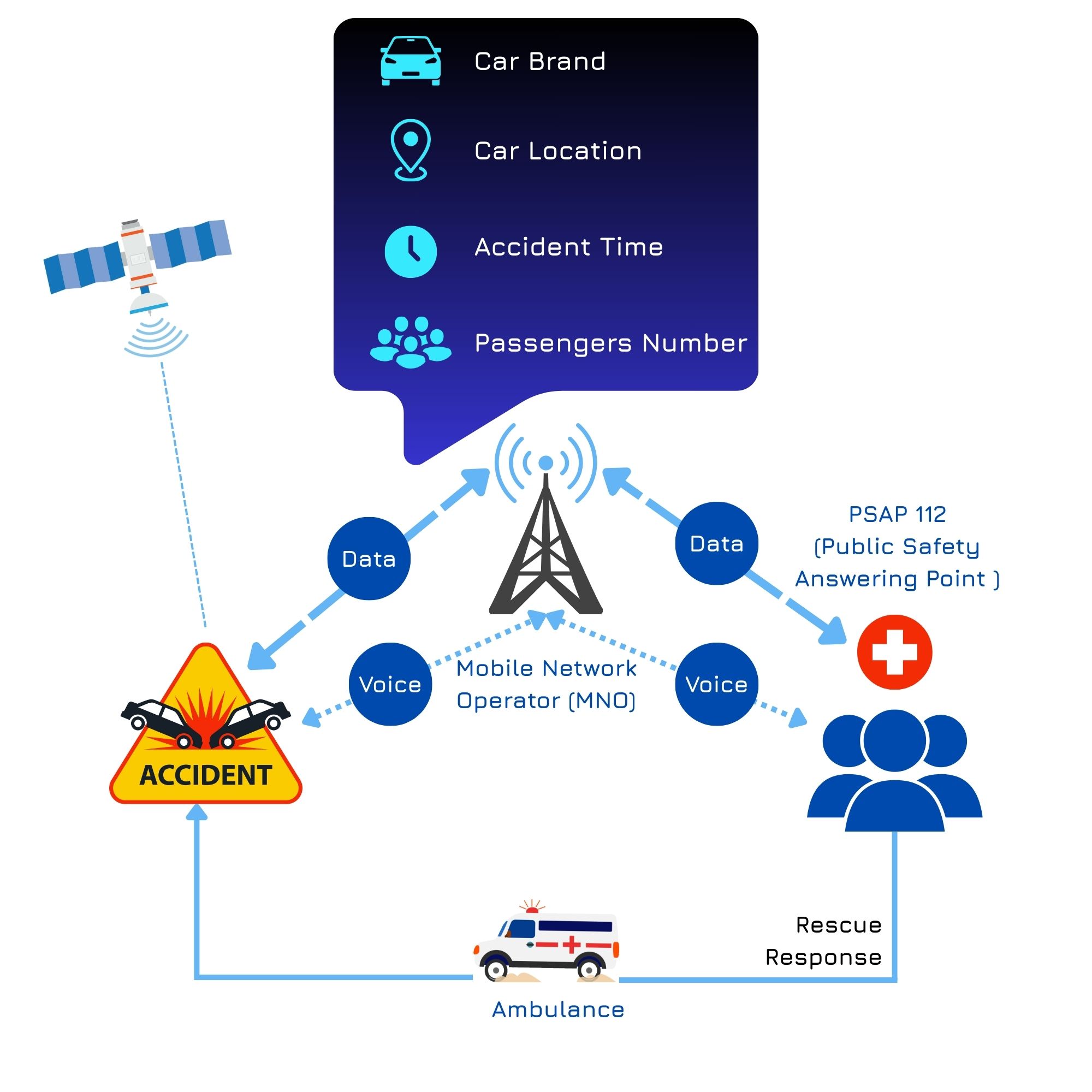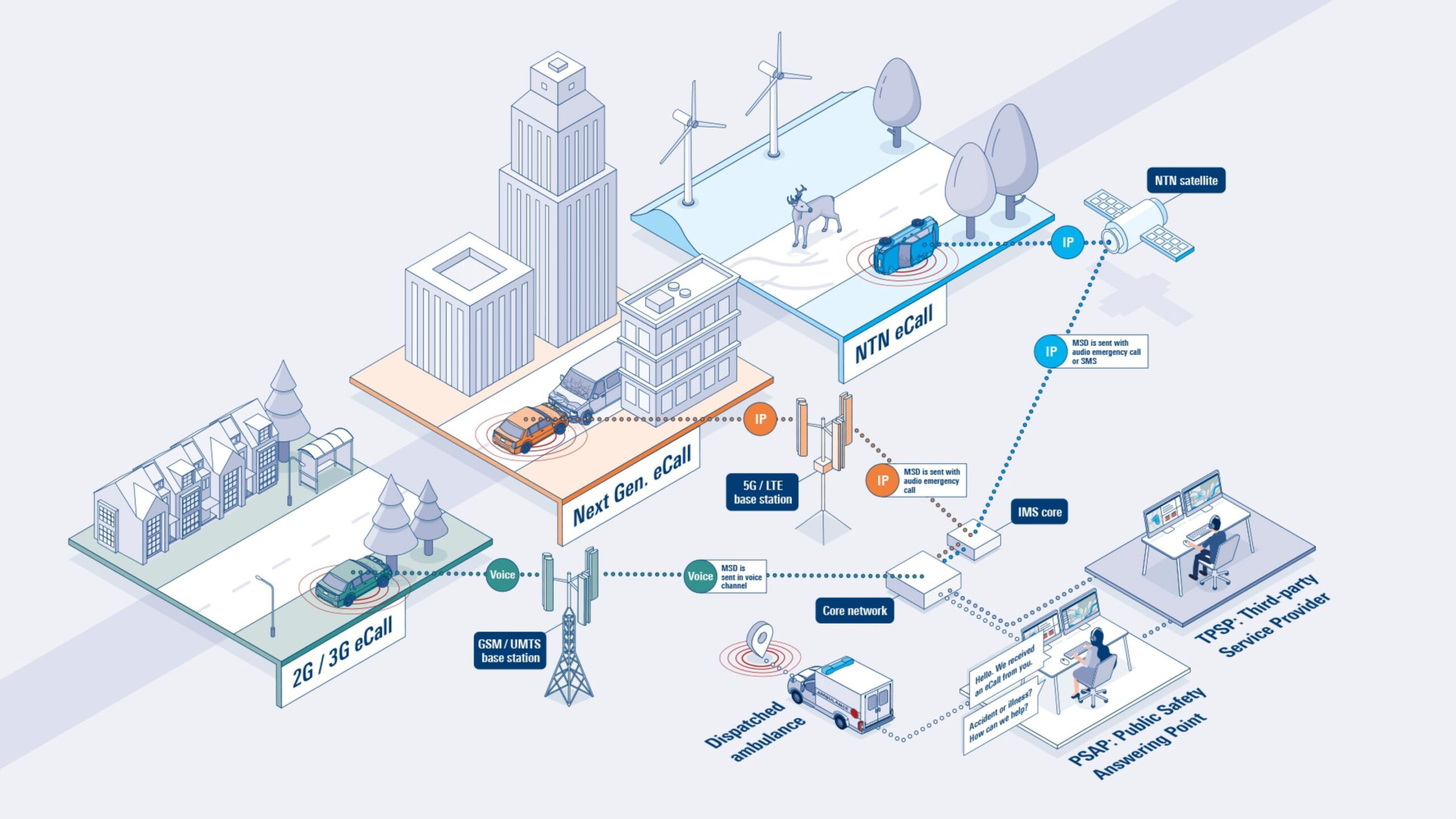In the age of smart mobility, eCall in connected vehicles is no longer a luxury—it’s a life-saving necessity. Designed to instantly alert emergency services during severe accidents, eCall systems are transforming road safety and becoming a key component of the global push for intelligent transportation systems.
What Is eCall and How Does It Work?
eCall (short for “emergency call”) is an automatic crash notification system. When a vehicle equipped with eCall detects a serious collision, it automatically initiates a call to emergency services (e.g., 112 in Europe). Alongside this voice call, a Minimum Set of Data (MSD) is sent—sharing the vehicle’s exact GPS location, time of the crash, vehicle ID (VIN), and direction of travel.

eCall systems also allow manual activation via a dashboard SOS button. And even if the car’s battery is damaged, a backup power supply ensures the emergency call is completed.
Global eCall Mandates and Safety Standards
The European Union was the first to legislate eCall: since March 2018, all new cars sold in the EU must be equipped with the technology. Other countries including Japan, India, Russia, and members of the Gulf Cooperation Council (GCC), have followed suit with similar regulations. Notably, Saudi Arabia has announced that all new light-duty vehicles imported into the Kingdom must be equipped with eCall systems starting January 1, 2027, as outlined in the SASO 2944:2023 standard. This regulation forms part of the country’s broader Vision 2030 strategy to enhance road safety and modernize transportation infrastructure. These global mandates reinforce the growing importance of eCall in connected vehicles as a standard for safer, smarter mobility.
These mandates reflect eCall’s proven impact: studies show it can cut emergency response times by up to 50%, saving approximately 2,500 lives annually in the EU alone.
eCall vs. Traditional Emergency Systems
Traditional emergency response relies on passengers or bystanders calling emergency services—a method that fails if occupants are unconscious or unsure of their location.
eCall eliminates that delay by providing:
- Automatic crash detection
- Precise GPS-based location sharing
- Immediate voice/data link with emergency responders
It’s a proactive solution designed for critical minutes when human action may be impossible.
How eCall Fits into Smart Mobility Ecosystems
Modern vehicles are built around advanced telematics, and eCall is fully integrated with that architecture. Connected vehicles use eSIMs, 4G/5G, and edge computing to enhance safety and communication. eCall is now evolving with these technologies into Next-Generation eCall (NG-eCall), enabling richer data exchange (e.g., passenger count, sensor health, even real-time video).
In the future, eCall will work seamlessly with:
- V2X communication (car-to-car and car-to-infrastructure)
- AI-based risk prediction
- Smart city platforms

OEM Adoption: Spotlight on Volkswagen Group
The Volkswagen Group has implemented eCall across its brands—VW, Audi, Skoda, SEAT, and Porsche. eCall comes standard in all new VW models, meeting and exceeding EU safety mandates.
Tier-one suppliers like Bosch also enable VW Group to integrate cloud-based eCall services, offering real-time vehicle data to emergency centers. This synergy between OEM and supplier sets a benchmark for connected safety solutions.
Horizon Connect’s Role on eCall in connected vehicles
At Horizon Connect, we support OEMs and partners in securely and efficiently integrating eCall in connected vehicles. Our solutions include:
- End-to-end eCall implementation and compliance support
- Integration with telematics and over-the-air (OTA) platforms
- Cybersecurity for secure data transmission
- Testing and validation for cross-border deployment
We work closely with OEMs to ensure their connected vehicles are smarter, safer, and regulation-ready across global markets.
Conclusion
As connected mobility evolves, eCall is becoming the backbone of vehicle safety. It transforms cars into active participants in emergency networks, helping save lives through real-time, automated communication.
At Horizon Connect, we’re proud to support this transformation—empowering OEMs to deliver smarter, safer vehicles for a connected future.


